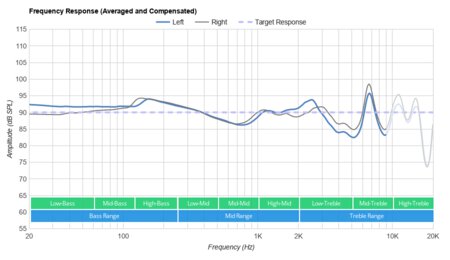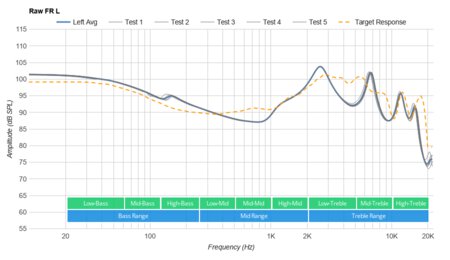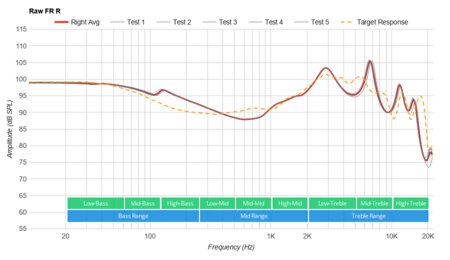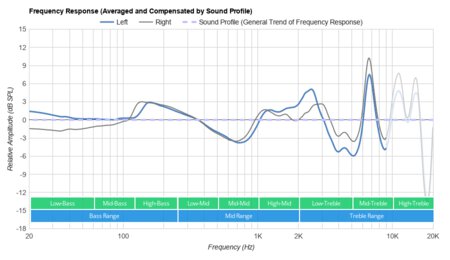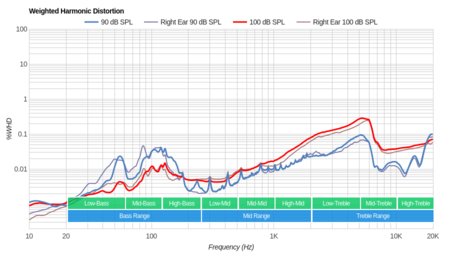The Jaybird X4 Wireless are great wireless sports in-ears that are versatile for everyday casual use. They block a decent amount of noise and barely leak. They're stable for most sports and portable enough to fit in your pockets. You can customize your sound to your liking with the MySound app, and they have decent battery life. They're very similar to the Jaybird X3 Wireless, slightly outperforming them for sound, but they keep relatively the same design.
Our Verdict
The Jaybird X4 are decent for mixed usage. They're versatile enough for everyday use. They're a good-sounding pair of headphones that are more comfortable than the previous Jaybird X3 Wireless. Unfortunately, they're in-ears, which might not fit everyone. They block a decent amount of ambient noise but barely leak. You also don’t need to worry about a wire getting in your way every day since they're wireless. They should also last you a good part of the day, thanks to their decent battery life.
- Minimal leakage.
- Stable and portable design.
- Above average and customizable sound.
- The in-ear fit is uncomfortable for some.
- Cumbersome charging cradle.
The Jaybird X4 are alright for neutral sound. They have decently balanced sound with a bit of overemphasized bass, great for bass-heavy genres. Like most in-ears, they have poor soundstage. On the upside, they're comfortable and sound good enough for casual listening. They also have an EQ, so you can adjust the sound profile to your liking.
The Jaybird X4 are decent for commuting. They isolate a decent amount of noise, and you can reduce ambient sound by listening to higher volumes thanks to their low leakage. They're decently comfortable for short trips like a bus ride, but in-ears might not be the best choice for longer trips like a flight. On the upside, the wireless in-ear design makes them very portable, and you can easily store them in your pockets or a bag.
The Jaybird X4 are great sports headphones. The different tips and stability fins options will let you find the most comfortable and stable fit for your activities. The in-line remote didn’t change from the Jaybird X3 Wireless model and still have a simple control scheme. Being wireless, you won’t have a wire in your way during your workouts. They're also compact enough to fit in your pockets, even when in their carrying pouch.
The Jaybird X4 are fair for office use. They have good isolation performance. They block a decent amount of ambient noise and barely leak, so you can mask more noise by raising your audio volume. Unfortunately, the fit is probably not comfortable enough for a full day of work. The battery life might also be too short for a whole shift.
The Jaybird X4 are sub-par for gaming. They have an average microphone but too much latency to use for gaming.
Changelog
- Updated Feb 20, 2020: Converted to Test Bench 1.4.
- Updated Nov 21, 2019: Converted to Test Bench 1.3.1.
- Updated Nov 21, 2019: Converted to Test Bench 1.3.
- Updated Oct 29, 2018: Review published.
Check Price
Popular Headphones Comparisons

The Jaybird X4 are good wireless sports in-ears, but they're versatile enough for everyday casual usage. Their sound quality is good for in-ears, and they have a comfortable in-ear fit that doesn't enter your ear canals deeply. The IPX7 rating is great for sports users who don’t want their headphones damaged from water exposure. Unfortunately, their charging cradle can be frustrating because you always need it to charge the headphones instead of finding a more universal and common cable to connect directly to them. On the upside, they're also compatible with the Jaybird MySound app, which offers good customization thanks to an excellent equalizer.
See our recommendations for the best wireless earbuds and the best earbuds with a mic.
The Jaybird X4 Wireless and Jaybird Tarah Wireless are very similar headphones, but the X4 have a slight edge. The X4 have a slightly longer continuous battery life, a more adjustable fit, and come with a soft pouch. On the other hand, the Tarah have a better wireless range. The X4 also have an in-line remote that doesn't feel as cheap as the Tarah’s.
The Jaybird Tarah Pro Wireless are better headphones than the Jaybird X4 Wireless in pretty much every single aspect. They have lower latency, have a slightly more accurate treble range, and have a way better battery life. Their designs are very similar, other than the fact that the Tarah Pro have magnetic and rotating earbuds and have a braided cable. However, the X4 support multi-device pairing, offer more fit options, and are less expensive.
The Jaybird X4 Wireless are an upgrade from the Jaybird X3 Wireless. They are a bit more comfortable and have slightly better sound quality, especially in the treble range, but these results might be due to the different ear tips. They are also more waterproof, being rated IPX7, while the X3 don’t officially have an IPX rating. On the other hand, the X3 have better noise isolation and slightly better latency performance, but both aren’t ideal to watch videos.
The Jaybird X4 Wireless are better in-ears than the Jaybird Freedom 2 Wireless 2017. They have better sound quality, a longer battery life, better leakage performance, better build quality, and are rated IPX7. On the other side, the Jaybird Freedom 2 are more comfortable, which can be the most important factor for some people.
Test Results

The Jaybird X4 look nearly identical to the Jaybird X3 Wireless. Even the in-line remote looks the same, but the tips on the earbuds and the stability fins don’t have the honeycomb design. They have a sporty look but come in even fewer colors than the X3, which were already less colorful than the previous Jaybird X2 Wireless.

The Jaybird X4 are more comfortable than the Jaybird X3 Wireless and Anker SoundCore Liberty Air Truly Wireless. The earbud-like tips don't enter your ear canal as deep (similar to the Jaybird Freedom 2 Wireless 2017 and the Skullcandy Jib Wireless), and they're a bit more comfortable than most in-ears. Like most in-ears, they’re not comfortable for everyone and can get fatiguing after long listening sessions. On the upside, they come with two foam tips that people usually find more comfortable.

The Jaybird X4's in-line remote is pretty much the same as the Jaybird X3 Wireless. Buttons are easily findable, and feedback is good. You get a volume control with track skipping and a basic play/pause button that also answers/ends calls. They're rated IPX7. The remote is also slightly better than the Jaybird Tarah Wireless, which doesn't feel as clicky but have the same easy-to-use three-button setup.

Like most in-ears, the Jaybird X4 are very breathable. Your ears aren’t covered, so heat isn’t trapped under an ear cup. They should not make you sweat more than usual, which makes them a great choice for sports.

The Jaybird X4 are wireless in-ears, so they're very portable. They'll fit easily in most pockets and bags to keep with you at any time. They also come with a small pouch, which doesn’t add too much bulk.

The Jaybird X4 come with a small pouch similar to the Jaybird X3 Wireless. It'll protect the headphones from scratches and minor water exposure. Unfortunately, it isn’t a small solid case like the Jaybird X2 Wireless have, but they stay more portable that way.

The build quality is the same as the Jaybird X3 Wireless. The cable is flat, and the headphones feel solid enough to survive a few drops without damage. They're also certified IPX7 for protection against immersion in water. Unfortunately, the cord management clips were replaced by a cinch that some people don’t seem to like as much.

The Jaybird X4 are stable headphones for most sports. You’ll be able to run and train with them without any problem. They come with four tip options, of which two are comply foam tips and three stability fins for you to find the most comfortable and stable fit. Being wireless reduces the risk of them getting hooked on something and pulling the earbuds out of your ears. Although the stability fins look a little different, they're essentially the same.

- Jaybird X4 headphones
- 2x silicone ear tips
- 2x comply foam tips
- 3x stability fins
- USB charging cable
- Charging cradle
- Shirt clip
- Carrying pouch
- Manuals
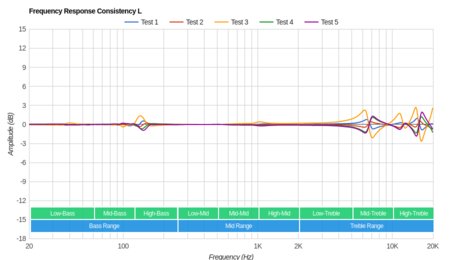
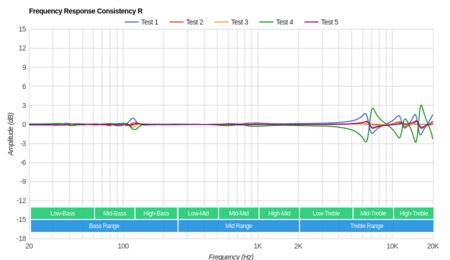
The frequency response consistency is outstanding. If the user can achieve a proper fit and an air-tight seal using the assortment of tips that come with them, they should get consistent bass and treble delivery every time they use the headphones.
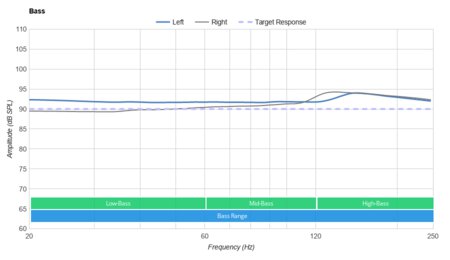
The Jaybird X4 have excellent bass. Their LFE (low-frequency extension) is at 10Hz, which is excellent. Low-bass and mid-bass are flat and within 1dB of our neutral target. This results in a deep and punchy bass with just the right amount of thump and rumble. However, high-bass, responsible for warmth, is overemphasized by more than 3dB, bringing muddiness to the bass.
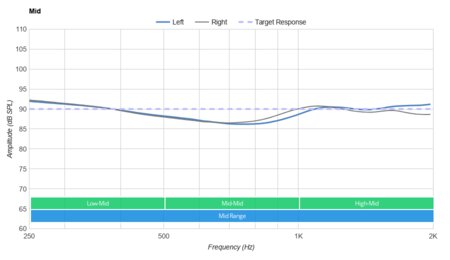
The Jaybird X4 have an excellent mid-range performance. The overall mid-range response is even and well-balanced, which is important for the clear and well-balanced reproduction of vocals and instruments. However, it shows about 3dB of recess centered around 700Hz. This nudges vocals and leads slightly to the back of the mix by giving more emphasis to bass and treble frequencies.
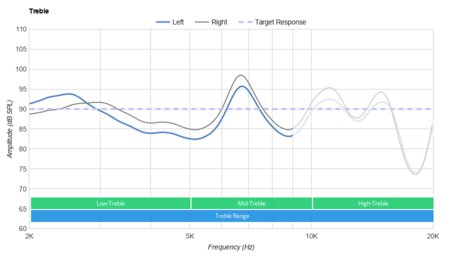
The treble response is decent. Low-treble shows a 4dB dip around 4KHz, which will hurt the detail and presence of instruments. The sibilance region (6KHz-10KHz) is uneven, making some S and T sounds a bit sharp and some others a bit lacking. This will be mostly noticeable on vocals and cymbals.
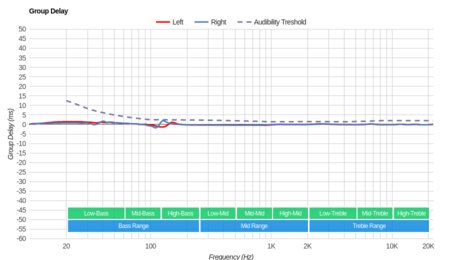
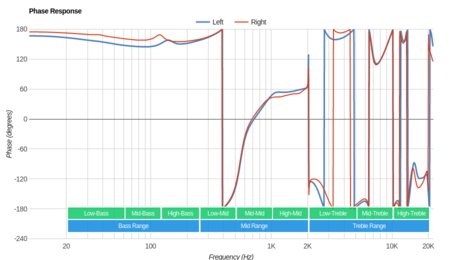
The stereo imaging is outstanding. Their weighted group delay is at 0.12, which is great. The group delay graph also shows that the entire response is well below our audibility threshold. This ensures a tight bass and a transparent treble reproduction. Also, the L/R drivers of our unit were very well-matched in frequency, amplitude, and phase response. This is important for the accurate placement and localization of objects (voices, instruments, video games effects) in the stereo image.
The soundstage is bad. This is because creating an out-of-head and speaker-like soundstage is largely dependent on activating the resonances of the pinna. The design of in-ears and earbuds is in such a way that fully bypasses the pinna and doesn't interact with it. Also, because these headphones have a closed-back enclosure, their soundstage won't be perceived to be as open as that of open-back earbuds like the Apple AirPods (1st generation) Truly Wireless.
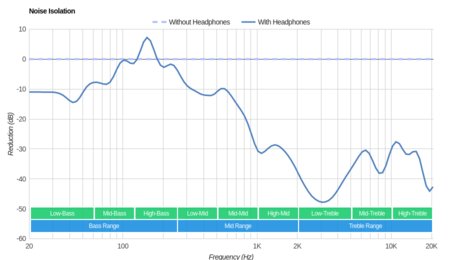
The isolation performance is decent. In the bass range, where the rumble of airplane and bus engines sits, they achieved almost 6dB of isolation which is mediocre. In the mid-range, important for blocking out speech, they reduce outside noise by more than 19dB, which is very good. In the treble range, occupied by sharp S and T sounds and computer fan noise, they isolate about 38dB, which is great. Compared to the original Jaybird X3 Wireless, the Jaybird X4 performs worse in the bass and treble ranges, probably due to their more earbud-like design. If you want sports headphones to run with while being aware of your surroundings, take a look at the Jabra Elite Active 45e Wireless.
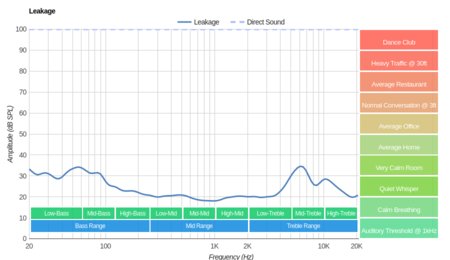
The leakage performance is fantastic. These in-ears practically don't leak, so you don't need to worry about disturbing people around you unless you are blasting your music in a very quiet room. With the music at 100dB SPL, the leakage at one foot away averages at 23dB SPL and peaks at 35dB SPL, which is noticeably quieter than the noise floor of an average office.
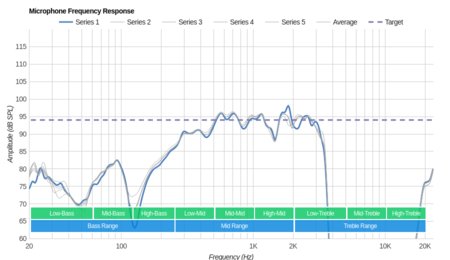
The microphone's recording quality is decent. Speech recorded or transmitted with the microphone will sound thin and muffled. This is due to LFE (low-frequency extension) being at 370Hz and the HFE (high-frequency extension) being at 3KHz. However, the limited high-frequency extension is a limitation of the Bluetooth protocol and is a problem with all Bluetooth microphones. Speech will still be decently intelligible on this microphone, though.
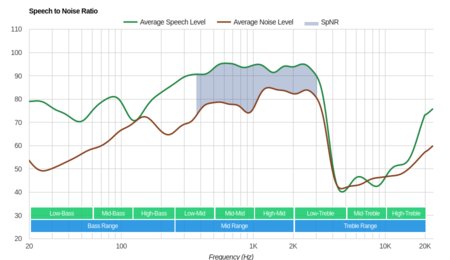
The in-line microphone is mediocre at noise handling. In our SpNR test, it achieved a speech-to-noise ratio of 13dB, indicating that they're best suited for quiet environments. But they won't be ideal for moderate and loud environments, as they will have difficulty fully separating speech from ambient noise.
The Jaybird X4 have about seven hours of battery life with a 1.7-hour charging time. They don't have any auto turn-off setting so be sure to turn them off if you plan on using them later in the day. The battery life can be a bit short if you plan to use them during your whole work shift, but most casual listeners will find it more than enough. Also, the proprietary charging dongle is restrictive, and you will need to keep it on you to charge your headphones at any moment. You can also check out the Jaybird Tarah Pro Wireless for their much longer-lasting 13-hour battery life, so you don't have to carry the cradle around on your person as often. If you don't want a cradle, look at the JBL Everest 110 Wireless and their nine-hour battery life.

Update 05/03/2019: We've updated the review since we had previously listed the Jaybird app as not having an in-app player, but it has an integrated one for Spotify Premium users.
Just like the Jaybird X3 Wireless, the Jaybird X4 are compatible with the Jaybird MySound mobile app. It offers an excellent parametric EQ and lets you access community presets from other Jaybird X4 owners. The app doesn’t offer room effects but has an integrated Spotify in-app player for Premium accounts. The app is a good tool to find the best sound profile for your mood and music genre. On the other hand, if you don't need the additional customization options, then consider the JBL Reflect Mini 2 Wireless. They have a similar design and performance overall but lack a good app.
The Jaybird X4 can pair with two devices, which is great if you want to frequently switch between your phone and computer. Their pairing procedure is also fairly easy as you just have to hold the play button on the in-line remote for a few seconds.
They have more latency than the Jaybird X3 Wireless, and it will be noticeable while watching videos or when gaming. 211ms is more than most typical Bluetooth headphones. Both models have more latency than the Jaybird X2 Wireless.

These headphones don’t have any wired option.
The Jaybird X4 don't have a dock. If you want a headphone that's versatile and has a dock, try the SteelSeries Arctis 7 Wireless 2017. However, it won't be as compact and easy to carry around as the X4.






